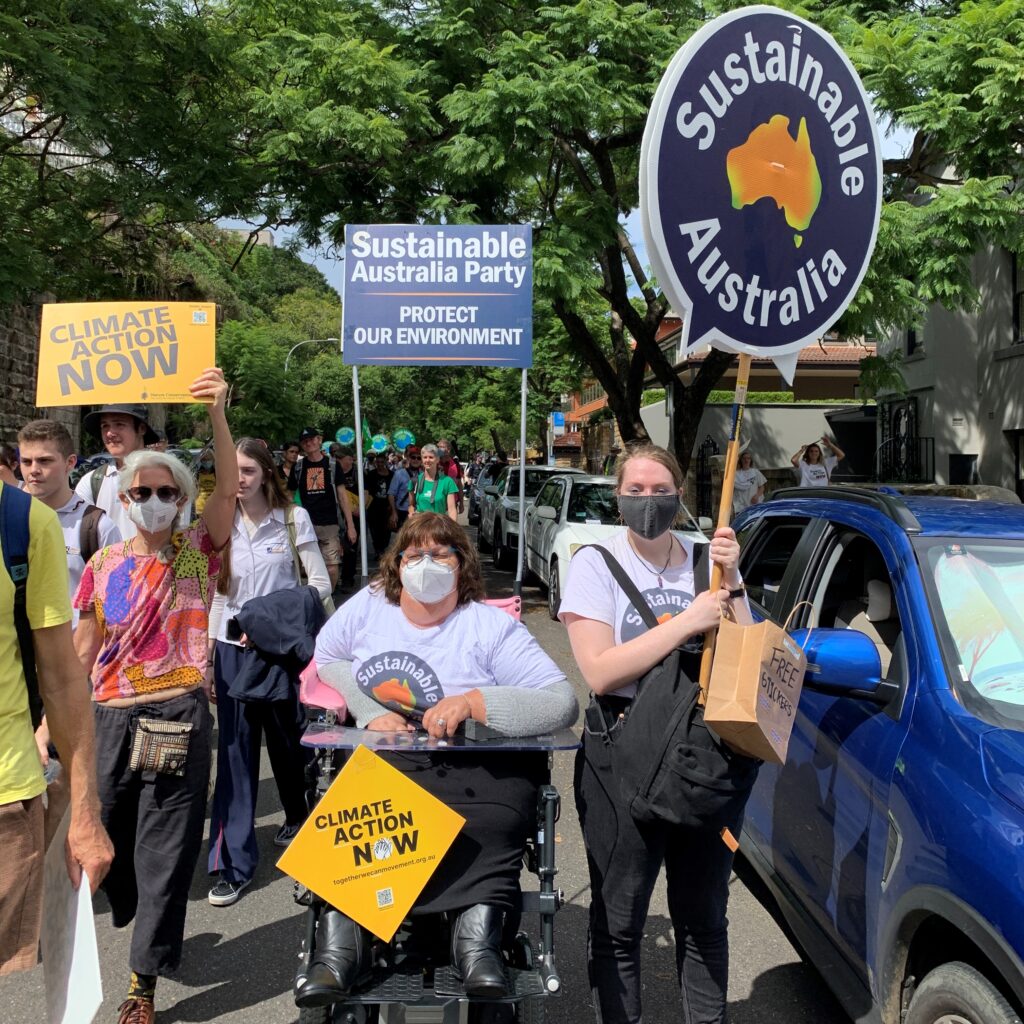LAMB, Georgia
Sustainable Australia Party - Stop Overdevelopment / Corruption

Climate change

Pictured: 2022 NSW Senate candidate Cr Georgia Lamb (right).
“The viability of our societies depends on leaders from government, business and civil society uniting behind policies, actions and investments that will limit temperature rise to 1.5 degrees Celsius.” Australian Broadcasting Corporation
“The world’s leading climate scientists have warned that the prospect of limiting global warming to 1.5C will be out of reach within 12 years at current rates of greenhouse gas emissions, in a report that finds it is now “unequivocal’’ that human activity is heating the planet.” The Australian [$]
- Act on climate change and contribute to staying below 1.5 degrees global temperature rise compared to pre-industrial levels (1)
- Support international agreements to lower greenhouse gas emissions including a target of net zero emissions by 2035
- Reduce emissions by at least 75 per cent below 2005 levels by 2030
- Encourage all countries to meet the same or similar climate goals
- Place tariffs or bans on imports where any relevant carbon pollution has not been priced into the goods and services
- Recognise that lowering Australia’s greenhouse gas emissions in to our minimum and particularly preferred target becomes much more realistic with a stable population
“Population growth had cancelled out three quarters of the global efforts to reduce carbon emissions in recent years.” PM
The greatest impact individuals can have in fighting climate change is to have one fewer child…” The Guardian
- Stabilise Australia’s population size as soon as practicable (also see Population & Immigration policy)(2)
“The federal government’s State of the Environment 2016 report (prepared by a group of independent experts) predicts that population growth and economic development will be the main drivers of environmental problems such as land-use change, habitat destruction, invasive species, and climate change.” The Conversation
The Victorian Government’s Victorian Greenhouse Gas Emissions Report 2018, is further shocking evidence (unreported in the mainstream media) of how government-engineered rapid population growth is wiping out our efforts to reduce per capita (and therefore total) emissions.
- Fund and subsidise research and development into renewable energy technologies and energy efficiency initiatives
- Adopt a renewable energy target (RET) in line with our commitment on zero net emissions
- Impose a moratorium on all new coal mines in Australia
- Impose a moratorium on all new fracking, including for coal seam gas (also see Energy policy)
- Phase out fossil fuel subsidies
- Adopt a globally consistent carbon pricing mechanism that does not unfairly penalise Australian industries
Forestry

- Manage Australia’s native forests so they increase in both quantity and quality
- Support a diverse range of plantation products, while recognising that plantations (monocultures) can and do cause serious environmental problems
- Restore failed plantations back to native forest
- Subject all state Regional Forest Agreements to the jurisdiction of the Environment Protection and Biodiversity Conservation Act 1999 (EPBC Act) to ensure all forestry is subject to appropriate environmental and planning approval requirements
- End all old growth forest logging (3)
- Impose a moratorium on all native forest logging given the huge loss of Australia’s native forests over the past 250 years, while we conduct a full national scientific enquiry into logging in Australia. This would answer the question of whether native forest logging is sustainable under the following strictly managed practices and scale:
- Avoiding habitats of all threatened, vulnerable and endangered native species
- Banning the export of raw materials (e.g. woodchips)
- Increasing the forest reserve system
- Operate on long rotations, ideally at least 100 years
- Maximising the Australian economic value-add for timber products
- Preventing Australian native forests and its waste from being burnt for biomass power as a ’renewable energy‘ source under any Renewable Energy Target or related scheme (this would be achieved through non-accreditation of such practises).
- Assist farmers and rural landowners, where practicable, to engage in agroforestry